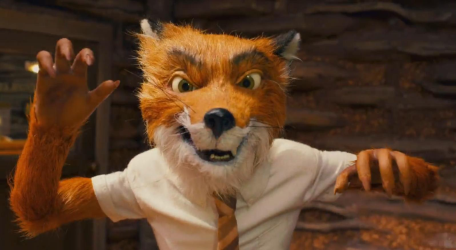By this point, we were psyched for anything Wes Anderson had to offer, including his new film, Isle of Dogs, and this one, Fantastic Mr. Fox, which I hadn’t loved originally. On reviewing, I feel like Burton’s execrable Willy Wonka movie had seriously soured my look at this film which, while still not that close to the Dahl concept is not as offensively far off, in terms of character relationships, as I had felt before.

Sorry, dude. I can be a purist.
Dahl often had a hagiographic take on parents (the good ones) which is not found that frequently in children’s literature, and while this movie falls far short of that, Mr. Fox isn’t as self-absorbed as I remembered him.
My original complaints about the animation hold up: I don’t think Anderson had a good grasp on stop-motion physics yet, and the rapid motion, while still kinda funny, is visually jarring. (That kind of high-speed stuff is gone from Isle of Dogs.) This time, too, I was able to appreciate a lot more of the detail that went into the film.

And the blocking! Always with the blocking!
The voice acting, again, is fine. Meryl Streep doesn’t stand out any more here than she did before, and Clooney is still perfect for the role—and he’s less ubiquitous these days so it almost seems like a George-Clooney-esque voice than actually him.
Of the films we saw this month, this also had the strongest sense of community. Fox is a genuine hero, not just to his family, but to all the underground animals. This makes his fall harder, and his ultimate redemption sweeter. I think the month of Anderson pictures really gave me a better perspective on that point-of-view.
Also, unlike all the other movies, Fox is less inexplicably awful, as seen in (e.g.) Royal Tenenbaum and Patricia. He’s ambitious and cocky, and sometimes has trouble relating to his kids, but he’s not just arbitrarily cruel. So, while I disapprove (somewhat) of the jokes aimed at the adults as non-Dahl-esque, I approve of the more heroic portrayal of father figures than is to be found elsewhere in oeuvre. In other words, I feel less like Anderson tried to hammer Dahl’s story into his own mold without regard for it—again, unlike Burton’s Wonka.
We had all seen it 8 1/5 years ago. We all liked it more this time.

Let’s close with the second-most Wes Anderson shot possible.
